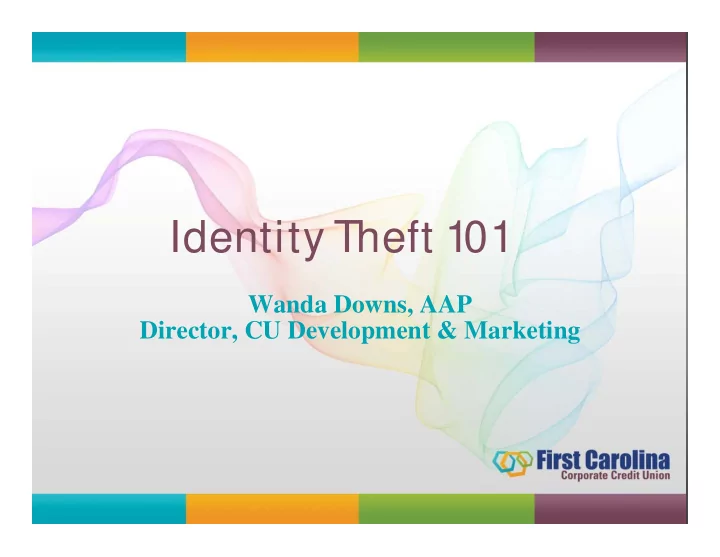

Identity Theft 101 Wanda Downs, AAP Director, CU Development & Marketing
Identity Theft 101 Identity Theft 101 • Wanda Downs • First Carolina Corporate Credit Union, 2004 to present > Director of CU Development & Marketing • AAP Certified 2009 • Graduate of CUNA’s SRCUS of Management, 1999 • Graduate of CUNA’s Financial Management, 1997 • Manager/CEO of Purolator EFCU (1994-2003) • Manager of Fayetteville Observer-Times CU (1992- 1994) • Victim of Identity Theft & Fraud 1997
Identity Theft 101 Identity Theft 101 • What is identity theft? Currently no STANDARD global definition Became a federal crime in the US on 10/30/1998 with the enactment of the Identity Theft and Assumption Deterrence Act of 1998, 18 USC § 1028 (a) (7) The Act covers both identity theft and identity fraud It is NOT just a financial crime
Identity Theft 101 Identity Theft 101 • Identity Theft vs. Identity Fraud This Act states that identity theft occurs when a person: “Knowingly transfers or uses, without lawful authority , a means of identification of another person with the intent to commit, or to aid or abet, any unlawful activity that constitutes a violation of Federal law, or that constitutes a felony under any applicable State or local law.”
Identity Theft 101 Identity Theft 101 • Identity Theft vs. Identity Fraud Identity fraud basically occurs when individuals knowingly and without lawful authority produces an identification document, authentication feature, or a false identification document with the intent to defraud others, including the United States.
Identity Theft 101 Identity Theft 101 • Information relevant to identity theft The victim’s name Date of birth Social Security Number Address Mother’s maiden name
Identity Theft 101 Identity Theft 101 • Types of identity theft Technological – Credit/Debit Card, Skimming, Pretexting, Man-in-the-Middle, Pharming, Vishing, Search Enging Phishing, SMishing Non-technological – Dumpster diving, Mail theft, Social Engineering, Shoulder Surfing, and theft of personal items
Identity Theft 101 Identity Theft 101 • Who’s at risk? * Center for Identity Management and Information Protection 25% 20% 15% 2011 2012 10% 2013 5% 0% 19 and under 20 ‐ 29 30 ‐ 39 40 ‐ 49 50 ‐ 59 60 ‐ 69 70 ‐ 79
Identity Theft 101 Identity Theft 101 • SC ranks #17 in the nation for identity theft complaints; NC ranks #24: 70.7 vs. 67.8 (complaints per 100,000 population) • NC ranks #23 in the nation for fraud and other complaints; SC ranks #25: 423 vs. 419 (complaints per 100,000 population) • Top 10: FL, GA, NV, MI, MD, CA, AZ, NJ, DE, TX, *NY • *Consumer Sentinel Network Data Book, 2013
Identity Theft 101 Identity Theft 101 • Most Common Uses
Identity Theft 101 Identity Theft 101 • What to do if you become a victim? File a report with the FTC File a police report & local federal authorities File a report with a credit bureau agency and obtain copies of credit report from each agency Maintain a copy of each report you file Notify the Social Security Administration College students should contact the Department of Education FOLLOW UP!
Identity Theft 101 Identity Theft 101 • Do’s of ID Theft Protection Review your credit report annually Review monthly financial statements Shred papers containing personal & medical information Use a secured box drop for mail Close unused credit accounts Protect your SSN Own a separate computer for financial matters
Identity Theft 101 Identity Theft 101 • Don’ts of ID Theft Protection Give personal or financial information to someone who calls/emails/texts you Use personal information on public computers or unsecured networks Write your PIN on any plastic card Give access to your personal financial devices to ANYONE! Open unknown attachments or click on links that look suspicious Leave receipts behind
Identity Theft 101 Pop Q Identity Theft 101 Pop Q uiz uiz • I carry my Social Security Card on me at all times. • When I leave home to go shopping, I take only my identification and the necessary credit card(s). • My PIN is written on my card or within my wallet. • I review my monthly credit card statements. • I review my healthcare EOBs to insure proper billing. • I always shred unwanted credit offers received in the mail. • I review my credit report annually. If you answer no any two of these, you could be doing more to protect your identity!
Identity Theft 101 Identity Theft 101 • Resources www.idtheft.gov https://www.annualcreditreport.com/index.action http://www.justice.gov/criminal/fraud/websites/idtheft. html http://www.utica.edu/academic/institutes/cimip/ Equifax, TransUnion, Experian Your Credit Union
Contact Information Contact Information Wanda Downs, AAP Director, CU Development & Marketing First Carolina Corporate Credit Union 800-585-4317, ext. 3276 wdowns@firstcarolina.org
Recommend
More recommend